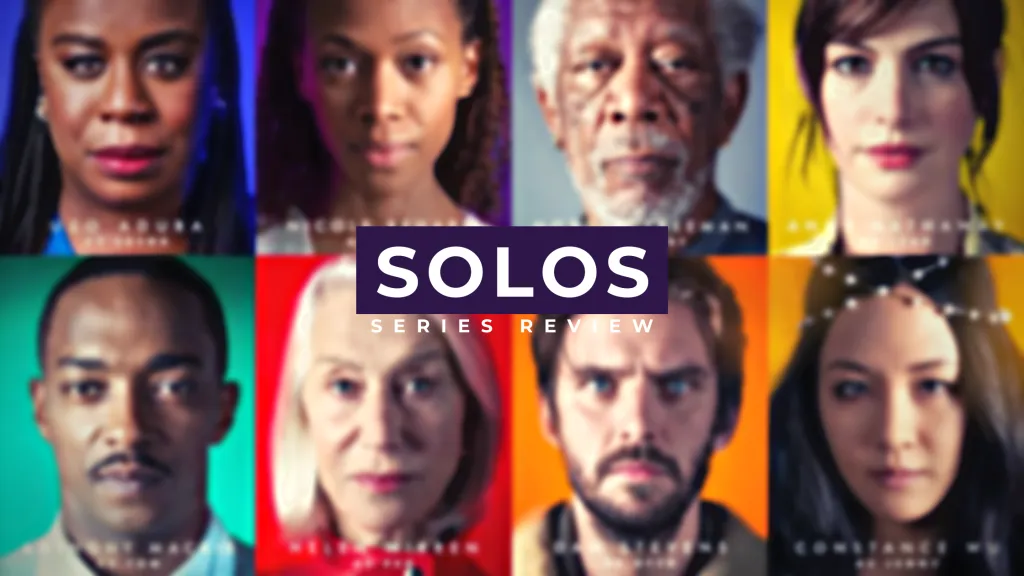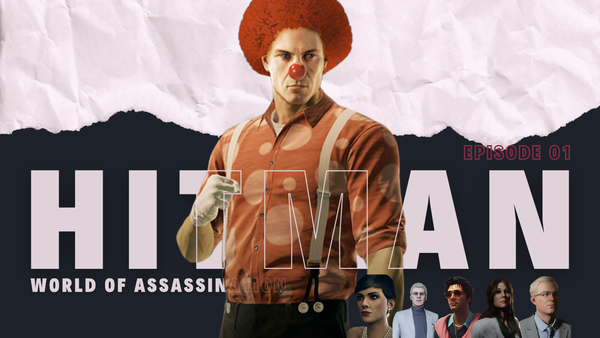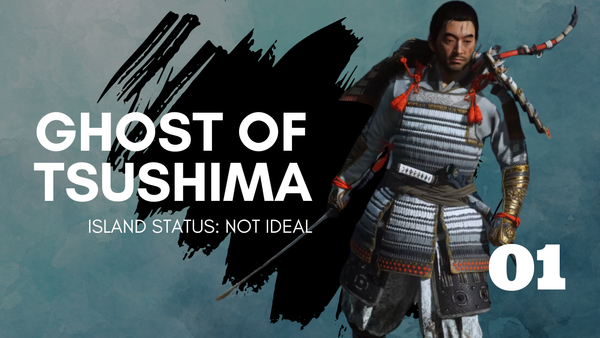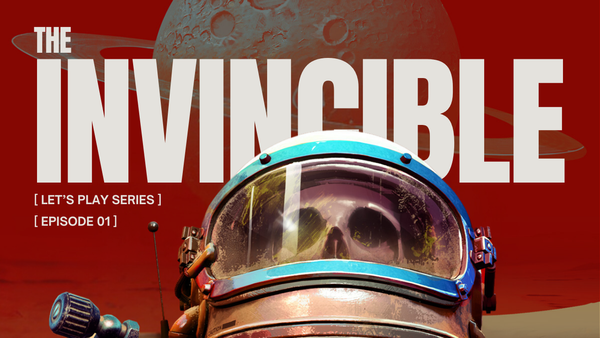SOLOS (Amazon Originals) | Review

What is SOLOS about?
SOLOS is about 8 people, from different times but the same universe. Eight people who drift together or apart, who are tied up together in the fabric of space. Each episode stars one person, only the finale features two. Each protagonist has someone to play off of, either themselves in a double role, or sometimes, an AI companion, a disembodied voice. Each performance is stellar, and each script is tangled up in speculative fiction tropes. Time travel, humans and bots, space and the advancements of technology. The good ones, and the bad ones.
The most haunting episode, perhaps, is Sasha. Starring Uzo Aduba, it’s set in a post-pandemic world in which the “return to normalcy” is so fraught, so marred by fear, that for Sasha, returning is impossible. Trusting anyone — not only institutions, but the people in her life — becomes impossible. The truth makes us cynical or paranoid, but in late-stage capitalism, in robo-capitalism of the future, the truth certainly does not make us free.
Anne Hathaway, Anthony Mackie, Helen Mirren, Uzo Aduba, Constance Wu, Nicole Beharie, Morgan Freeman, and Dan Stevens star in this collection.
Leah
Time travel and sacrifice

Leah’s story is about changing the past to protect someone she loves, and being willing to sacrifice her own existence to achieve it. But first, it’s about wanting to run away.
When her mother is diagnosed with ALS, Leah doesn’t want to figure out time travel to go to the future to find a cure. She just wants to run, to go anywhere where… it’s already happened. To go where her mum has passed away, so she doesn’t have to live through it herself.
This isn’t to say that she isn’t already making sacrifices. She’s the one who takes care of her mum most of the time, with her sister Rachel only filling in, seemingly reluctantly. There is resentment stored up between the sisters, in Leah for being the one always taking care of everything, and in Rachel for Leah being the favourite, the one who always knows what their mother needs, the one their mum always asks for. The one who’s perfect.
This is also the world that Leah wants to get away from. She never asked for that responsibility.
And in the end, she does it: she cracks the formula, though not the way she thought: her future self, again, is selfish: wanting to dissuade her past self from still trying. She wants to stop her from running, because going to a time when it’s happened without her will not make the pain go away. She wants forgiveness for going. And a little bit, she wants to keep what she has: she got rich, you see, off figuring out time travel. She’s got all the accolades, she’s friends with Mark Ruffalo. She says that, if Leah has a future, there are so many more things to discover. And she wants to discover them. But there’ll still be one (1) Leah left.
Because in the end, Leah of 2024 makes a different choice: because of the butterfly effect, she can’t change the past without destroying everything else — every other timeline in which Leah lives. But in giving her younger self the part she needs to travel as far as she needs to go to find a cure, and then further back, to give her the cure.
Every day feels like a year. Every day is a year. Every day is a gift.
Tom & Peg
Death, the ones who stay behind

In a world where we can create a Remember Me Bot, a true-to-life-looking, robotic version of ourselves (if we have the money, that is), for whom do we really leave them behind before we die? Do we really do it for our families? Or do we do it for ourselves? Do we wish for our loved ones to remember us, or do we want to be remembered?
What good is having a robot — not a clone, a bot — in your life, acting like your dead partner, your dead parent? Would you really want them to be? Would it really give you solace?
There is a degree of separation between Tom and Tom 2’s selves — Tom 2 says, “I’m glad I got you,” implying that there was a sense of self, of identity there before he was moulded into Tom, implanted with his memories. Before he learnt how to be him. And at any time, Tom 2 is nothing but self-aware. He knows. And it seems unlikely that he will ever get things confused, as well.
And what would have happened if Kelly had not died as well, soon after? If they’d all lived together, with Tom 2 never ageing? Were Remember Me Bots always meant to go back to the factory after a few years?
Anthony Mackie is incredible in this double role.
The queen of the castle lost her crown

Tom and Peg’s episodes are the most closely connected; and in her retelling of her life we see that, in the end, Tom 2 didn’t get to be around for very long. Peg and Wilder’s mom died soon after her husband — the original Tom — passed, and Tom 2 did his best to look after them, didn’t want to give them up, but in the end they were taken away from him and Peg and Wilder were sent to their grandmother in Britain.
Calling back to Tom 2’s sense of identity: In Peg’s retelling of their live with “Dad 2,” there seems to have been little joy in it. Kelly, Tom’s wife, didn’t want the kids traumatised by Tom 2 “powered down in the corner,” so she slept next to him each night — that’s what Peg remembers. But what would it have been like for Tom 2, to do that? To be reminded so starkly that he’s not Tom. Of course he knows, but his purpose was to love this family, to take care of them. Would it have been painful for him? What I don’t understand is that, considering that Tom had the 30 grand to spend on having the bot made, whether the house might not have been big enough for Tom 2 to sleep in the guest room. That details seems to very easily further dehumanise him, emphasising the burden placed on the family, especially Kelly, to have the bot in their lives. It conjures up images of a cold, loveless marriage bed; with the other side occupied by a cold, lifeless carbon copy of the man she loved.
And Peg, the little girl Tom described as fearless, as the commander-in-chief, she’d become someone so… different.
“I don’t want to be a bother.” Peg, SOLOS Episode 3
She says so over and over again. And she tells the AI on board the capsule she’s travelling in just past the moon about all the missed chances in her life — chances missed for nothing but fear. Fear of rejection, fear of abandonment? Fear of feeling, perhaps. Feeling too deeply. And when she never answered the phone, love stopped calling. Instead of hoping for the best, she’d believe the worst. And when she was ready to call back, it was 30 years later.
But what shines so brightly is that the connection between them remains alive. As Tom loved Peg endlessly, so did she love her dad. And as deeply sits the pain deep in her bones, deep inside her. But she still knows she is smart, and funny, and bold. She’s just… forgotten how to be. Losing her parents crushed it out of her, and nearly for good.
Sasha
Quarantine, unending

Uzo Aduba’s titular character Sasha has lived through a global pandemic. I don’t want to spoil too much, but the way that the script connects to experiences we will recognise, turns of phrase that run like fault lines through the dialogue that at once expose late-stage capitalism’s commodification of human experience, good or bad, and our own paranoia, however justified… was intense.
Sasha is lost — a phrase so often referring to conspiracy theorists, anti-vaxxers, and Covid deniers. But here, she is the one who can’t be reached. After twenty years of staying at home, she is lost. She has missed her re-entry window, convinced that what the media are showing her is not real. That her friends, her family are being impersonated by AI to convince her to “step outside.” And she is right, there is no reason to trust The Company; or The Powers That Be. You simply do, or you do not.
There is a fine line to walk here — because that is exactly what hoaxers spout every day. That the rest of us who urge caution, even now, are “addicted” to lockdown. Are licking the government’s boots, are sheep who believe everything we’re told. That we can’t “let go” of the pandemic. That we let it rule our lives.
But that is not what the episode is saying. It takes to a logical — and irrational — extreme the fear that has characterised many lives over the past 18 months or more. It sharpens to knifepoint what I wrote earlier: that re-entry is hard. That “returning to normal” feels impossible. That after being urged that only staying home is safe, the notion of the outside being safe once more seems, sometimes, unfathomable. It’s a fragile band of trust. Hoaxers would claim that being urged to stay at home is manipulation. Hoaxers would claim that the pandemic itself is manufactured. Sasha posits that the virus was an experiment. She claims that the news she sees 20 years later, of people going outside and enjoying themselves, is fake. She believes that the videos her best friend Nia sent her all that time ago are the truth.
It’s the horseshoe of conspiracy. If all is lies, nothing is real; and all you can do is decide which part you believe is the lie.
“You can’t lock me in my home,” becomes, “You cannot force me out of my own house.” The big difference is that, in SOLOS, The Company locked the doors. People were not only urged to stay inside, they were locked in. And when it was deemed safe to go outside again, the doors were unlocked.
What’s most heartbreaking is that, through it all, Sasha is so certain that she can tell. That she can always tell.
“It’s not a crime to want to stay in a safe, controlled environment.”
— Sasha, SOLOS Episode 4
She’s right. Those of us who are wary of returning are not harming anyone. But those who are rushing… they might be.
But that is what the script is saying. That the return to ‘normalcy,’ to the ‘status quo,’ is an illusion, but one that capitalism must maintain. It must pretend, to sustain itself, to force us all back to the workhouse, that we are not forever altered. That this global event has no endemic, long-lasting, permanent effect on generations of people, of all ages, who will never forget this. Who will one day shake themselves and wonder that they haven’t felt a niggling worry, perhaps, and for whom that will be a novelty. Who will for months, perhaps years, shake off the feeling that whatever world we will return to, is the unreal one. Yes, we will be able to go outside again. But we will not be the same when we get there.
We are traumatised. It is a word Solos does not use in that episode, but it’s what Sasha means when she says, “We are gonna need a deeper word than [horrific].” And in the end, her Zen companion reads a statement to her that says that the board of directors decided that, after 20 years, forcing her re-entry would be “detrimental to the new society we have created” — we being who? The Company? The people who survived, together?
In our world, governments want us to return to normal: the old, unsustainable, planet-wrecking normal. Normal that obliterates the ozone layer and our own self-worth. What the majority of people want to return to is fun. Is community. Is a goddamn hug from a friend. Is safety.
For Sasha, even with a local network, that became impossible.
Jenny
Content warning: anyone with issues/triggers regarding infertility, difficulty to conceive, or pregnancy in general should perhaps skip this one. Or, at least, you know, be warned.
Tragedy unfolds

Jenny’s tale is such a deeply strange, tragic one. It’s the worst day of her life, and she is stuck reliving it — inside her own head. After the horrible accident that kills her neighbour’s young son, she’s in a coma with no chance of waking up, her consciousness about to be uploaded prior to her death. (Again, only something rich people will be able to afford, I’m sure.)
Jenny’s story, in the end, is all about blame. It’s about her loveless marriage, wanting to fix things by having a baby. It’s about being unable to conceive. Constance Wu fully leans into Jenny’s rigmarole of embarrassing memories and, frequently, bad choices. She could easily star in a Bad Moms sequel — if her character had been pregnant on the day in question. But she wasn’t, and she wanted a baby so badly, and instead of helping her, instead of giving even two shits, all her husband did was yell at her that she was making a scene. He didn’t go after her when he realised that she was leaving the party drunk. He didn’t stop her from drinking so much. He didn’t stop to ask why she was acting that way, didn’t stop to ask whether she was upset.
He just let her leave.
Fun fact: I hate the tech who leaves her consciousness to stew in her distress more than I could ever begrudge her for what happened.
Jenny’s story is at once the skewering of toxic ideas of motherhood and the still prevailing puritanical idea of marriage; prevailing especially in the US. Being isolated to the point of calling the wife of your husband’s coworker your best friend even though you’ve only met her twice; not being able to talk to your spouse, not even really liking them, but staying with them regardless because that is what’s expected. Getting married too young and then trapping yourself in that relationship because getting a divorce would mean conceding failure. Because especially wives are being blamed for divorce: they couldn’t keep their man happy, after all. They didn’t put enough into the relationship — when it’s so often the husbands who do absolutely none of the work. Like Jenny’s husband, who doesn’t even know that for months, her best friend was a young boy. Her only confidant, too. The only one she felt she could talk to about how unhappy she was. The only one who listened to her and didn’t judge her for what she was feeling; much as he’d have been too young to truly understand. But that kid cared. And now he’s dead, and she’s on her way.
Only in the ‘burbs.
Sidenote: all of SOLOS is indelibly influenced by the American perspective, and I wish desperately that they’d make a series set, written, and produced in Europe (and not just the Western part), in different regions of the African continent, and in the Middle East, in Asia, and South-East Asia, then taking a turn further South to New Zealand. Imagine giving Taika Waititi such a format. Just saying.
Nera
Content warnings: anyone with issues/triggers regarding pregnancy, labour, and childbirth may want to skip this one.
The bad seed

Nera’s episode stars the indomitable Nicole Beharie, who I am so happy to see on my screen again. After her exit from Sleepy Hollow, a show that treated her very badly, compounded with health issues that she only publicly spoke about in 2020, she stopped working for a while. But she’s back on top form now, and her turn in SOLOS is stunning. The story is disconcerting, certainly for someone like me who does have some issues surrounding pregnancy and childbirth myself, so this was not easy to watch. But I persevered, and I was rewarded. (Everyone with similar issues, though, your safety is more important. Don’t sit through it just because I did.)
Nera’s episode directly deals with the horror fiction trope of the bad seed, with some sci-fi added to it in the realm of futuristic fertility treatments and something going very, very wrong.
Her baby, Jacob, is born too early. She’s alone, entirely alone at her house, remote from the next emergency facility, and there’s a blizzard on. Communications keep dropping out, she can’t reach either the hospital or her doctor. In the end, she births her child on her own. She makes it through but by her own stubbornness, and just when you think, well, there’s still half an episode left, this can’t be it… you’re proven right.
Because the baby is not normal. How can it be, when in the space of a minute, a newborn baby turns into a toddler who can walk, and talk. And then into a young boy. And then, into a pre-teen. And then, into a teen. And then, into a young adult.
When Nera finally reaches her doctor, it becomes clear that this is a defect that is apparently filed under “side effects.” Under abnormality. The doctor tells her that this child is dangerous.
The doctor tells her that she has to kill her baby.
And she’s ready to do it. She takes the knife, and she’s ready to do it.
But then she realises that this young man has done nothing wrong. All he did was to be born, and he did not ask to be. She wanted a baby so badly that she had one by IVF, without a partner, looking to raise the kid on her own. And now, he’s a young Black man, and there are police officers outside her door. And she says, No. My son did nothing wrong.
Stuart & Otto
Stolen memories, stolen lives

Stuart’s tale is a story of two men, bound by nothing but chance. It’s the story of a world where, when consciousness becomes commodified, it can easily become a drug, too.
Sometimes, people’s memories are sold instead of safely stored, and people would pay good money to have them injected. They’d get addicted, and over time, the overuse of that particular drug would chip away their own minds, their own personalities, their own memories. That is why, they may present as, and be mistaken for, cases of dementia. They are virtually shells: only the bodies left. No memories, no thoughts.
That is how Otto finds Stuart, on a beach, in a permanent care facility.
Stuart used to be an addict, and he’d resort to assault and robbery to get his next fix. (I’m not sure I’m comfortable with the show casting a Black man in this role, but as the cast is overall diverse, perhaps it stands out less like a sore thumb.)
Stuart stole Otto’s memories, just after his mother had passed. He assaulted him in a hospital corridor by a vending machine, and took the only thing he had left of his mum. His memories of his childhood, of going to the playground with her. Her smell. The way her hug would feel.
So bereft, he spends his days now scouring the earth for memory users who might have injected themselves with his memories. And to wake them up, he gives them a stem cell treatment and a bargain: if they can remember her, and tell him as much as they know, he won’t rat them out. And in Stuart, he’s finally found his man.
This encounter between these two characters is trepidatious and haunting and startlingly intimate. For all that Otto has grounds to hate Stuart, they become close. His memories are part of Stuart’s consciousness. He’s the only key left, but it’s more than that. They get along, and there’s warmth there where you’d expect only disdain.




